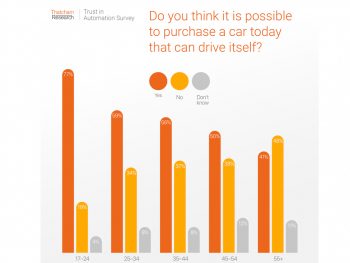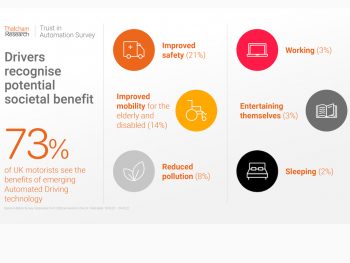Half of UK drivers think self-driving cars already on sale
More than half (52%) of UK drivers think they can buy a fully autonomous car today, emphasising the need for stringent consumer education including among fleets.

The false impression regarding the current availability of self-driving technology was more prevalent in younger age groups
Currently, only Assisted Driving systems, which require driver support, are available in the UK.
But Thatcham Research’s new Trust in Automation consumer study shows that the self-driving hype is convincing drivers that today’s technology is more capable of taking the wheel than it is in reality.
And it’s warning that putting the Government’s stated safety ambition for automated vehicles into effect is dependent on driver education.
Recently revealed government plans set out that self-driving cars could be fully rolled out on UK roads from 2025.
However, the first iterations of the technology, known as ALKS (Automated Lane Keeping Systems) can only be activated on motorways with the driver needing to resume control as required.
Matthew Avery, chief strategic research officer, said: “With more than half of the UK public believing that autonomous driving is here today, the perception is racing ahead of the reality. This demonstrates just how much work needs to be done to set realistic consumer expectations of the first vehicles offering limited self-driving functionality, when they become available. Put simply, the benefits of automation will not be delivered if people don’t fully understand its limitations.”
Younger drivers (77% of 17-24-year-olds) were more likely to be confused about the current availability of self-driving technology compared to those aged 55+ (41%).
Thatcham Research also warned that the industry must be cautious with the language employed to sell automation and drivers must be made aware of the limitations of systems – not only in the early stages of adoption but also as we move towards fuller levels of automation.
In November 2021, the UK auto sector made a pledge on clear and comprehensible marketing of automated vehicles, working on guidelines to end confusion and ensure their clear and safe use, including with how system capability is described in dealerships.
And Thatcham Research has said that it’s crucial that the existing guidelines are adhered to, along with the subsequent principles currently in development with the AV-DRiVE Group for ALKS specifically.
Jonathan Dye, head of underwriting at insurance firm QBE and chair of the Automated Driving Insurer Group (ADIG), concurred the new research shows it’s critical that drivers (or in the future ‘users in charge’) have a clear understanding of a vehicle’s capabilities and their obligations regarding its safe use.
He also said that alongside auto sector education and collaboration, the industry will also need to be transparent on what each specific vehicle is capable of at a point in time.
“With some models likely to have the self-driving technology as ‘optional’, or as an ‘over the air update’ – meaning it would be possible to change a vehicle’s capabilities overnight – it’s imperative the driver has a full and clear understanding of the vehicle’s limitations post update and that they are adequately protected by purchasing an appropriate insurance product.”

Drivers do recognise the societal benefits of autonomous driving tech
Drivers aware of benefits but hesitant to use
The research also found that drivers are interested in the potential for automated driving to enhance safety.
When asked what they consider the key benefits of the technology to be, the most popular option was improving safety through removing human error (21%), followed by improving mobility for the elderly and disabled (14%) and reducing pollution through fewer traffic jams and unnecessary acceleration / deceleration (8%).
Very few drivers saw freeing up time to work (3%), entertain themselves (3%) or sleep (2%) as advantages to automation.
Drivers may also be hesitant to make the leap. A total 44% of UK respondents will wait for the technology to mature before they would consider purchasing a car with self-driving capability.
And even though drivers were most likely to see safety as a key benefit of automation, the survey found that 76% of drivers would keep their eyes on the road when the first cars with self-driving capabilities such as ALKS were made available to them.
This is despite respondents being told that the technology would specifically allow them to take their eyes off the road.
Thatcham’s Matthew Avery added: “Even when told they can rely on the system and take their eyes off the road, most people would still prefer to oversee the driving task. This suggests that although safety is seen by many to be a key benefit of automation, trust and confidence needs to be nurtured over time.”
He summed up: “With the majority of drivers stating that they intend to keep a watching brief on how the technology behaves on the roads, it’s vital that all industry stakeholders come together to instil trust in automation by ensuring motorists have a firm grasp of their legal obligations and the performance limitations of systems.”












